

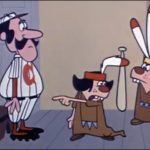
Today, we shift gears, presenting a run of baseball-themed cartoons from Total Television, and then, to complete today’s lineup, a solo shot from Larry Harmon’s Bozo the Clown.

We begin with six cartoons from the various elements of Total Television’s first major success, King Leonardo and His Short Subjects. No exact air dates seem to be available for this series, so most if not all of these titles are believed to date from either 1960 or 1961
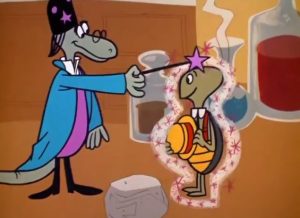 Kink of Swat (Babe Rube) (Tooter Turtle) – Tooter’s latest favor to ask from Mr. Wizard is to make him a big-league ball player. He enters Mr. Wizard’s home carrying a bat, and claims to have a home-run swing (smashing a water putcher as he demonstrates). “And I’m a switch-hitter too”, he boasts, smashing a lamp with his swat in the opposite direction. Mr. Wizard is for once eager to grant Tooter’s wish – anything to get his swinging somewhere other than inside the house.
Kink of Swat (Babe Rube) (Tooter Turtle) – Tooter’s latest favor to ask from Mr. Wizard is to make him a big-league ball player. He enters Mr. Wizard’s home carrying a bat, and claims to have a home-run swing (smashing a water putcher as he demonstrates). “And I’m a switch-hitter too”, he boasts, smashing a lamp with his swat in the opposite direction. Mr. Wizard is for once eager to grant Tooter’s wish – anything to get his swinging somewhere other than inside the house.
Tooter, as Babe Rube, becomes member of a ball club whose other players dwarf jim by comparison. The manager calls upon Tooter to assist the other boys in batting practice – oddly resulting in Tooter being seized up by the ankles and used as a bat by three players, the last of whom tosses him away after socking a hit, Tooter flying straight into the outfield fence and punching a hole in it. “No use flying off the bat handle. It’s all in the game, I reckon”, says Tooter without resentment. Tooter next receives instruction in base running. He is ordered to charge the first baseman with all his might to make him lose the ball. Instead, Tooter loses his head, which becomes compressed into his shell when he collides with the baseman’s shoes/ Tooter is next told to make a slide into second. Much like Charlie Brown when hit by line drives, Tooter loses all of his uniform in the process, and sits on the baseline in his underwear, while the manager returns his clothing to him, reminding hum “Those uniforms cost money.”
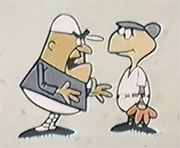 The big game arrives. The manager attempts to find a proper fielding position for Tooter. Center field doesn’t work out so well, Tooter colliding with the fence and knocking out one of its boards in his attempt to get under the ball, and still dropping it. Shortstop might have possibilities, but Tooter gets his signals mixed, and can’t decide whether to toss to second or first for a double play, allowing two runners to trample him and score. Somehow, the top half of the inning finally ends, and Tooter comes up to bat. His best swings are ineffective, with two strikes called upon him quickly. The manager says he needs a bigger bat, and substitutes a larger piece of lumber about as tall as Tooter himself. Tooter can’t control it, and the force of his swing launches the bat skyward, Tooter still clinging to its handle. “Help, Mr. Wizard! I’ll be a blob in the bleachers. A fly spot in the outfield.” As usual in every Tooter cartoon, Tooter is swept back to the Wizard’s house in a spiral – “Time for this one to come home.”
The big game arrives. The manager attempts to find a proper fielding position for Tooter. Center field doesn’t work out so well, Tooter colliding with the fence and knocking out one of its boards in his attempt to get under the ball, and still dropping it. Shortstop might have possibilities, but Tooter gets his signals mixed, and can’t decide whether to toss to second or first for a double play, allowing two runners to trample him and score. Somehow, the top half of the inning finally ends, and Tooter comes up to bat. His best swings are ineffective, with two strikes called upon him quickly. The manager says he needs a bigger bat, and substitutes a larger piece of lumber about as tall as Tooter himself. Tooter can’t control it, and the force of his swing launches the bat skyward, Tooter still clinging to its handle. “Help, Mr. Wizard! I’ll be a blob in the bleachers. A fly spot in the outfield.” As usual in every Tooter cartoon, Tooter is swept back to the Wizard’s house in a spiral – “Time for this one to come home.”
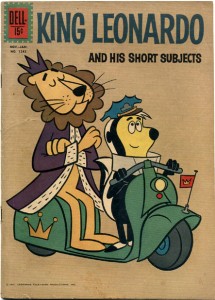 Debased Ball/Bats In the Ballpark (King Leonardo) – A playoff game is scheduled to take place in the Bongo Bowl between the Bongo Congo Braves and the Koco Loco Kards. The Kards have been the home team’s arch rival for years, and consistently won each playoff in which the two teams have participated. But King Leonardo is convinced that his pitching is really in the groove this year, so that the outcome of this game is sure to change. Odie O’ Cologne seems to be in agreement, as the King’s curve ball turns loops around Odie before landing in his catcher’s mitt, and a fast ball knocks Odie completely out of his catcher’s gear. But Biggy Rat and Itchy Brother have different ideas. First, they rile up the population of Bongo Congo at a public meeting, getting the populace so sick and tired of the annual losing, that they rally behind the position that if the King loses again, he loses his crown. Next, a trip to evil Professor Messer’s lab, for a gimmick to ensure a loss for the home team. After several “blown” attempts to mix the correct proportions of liquid ping and liquid pong, the professor creates a ball that is repelled by wood, dodging away from a bat swung at it. To get the ball into the game, Biggy has already ensured that the Koko Loco coach is out of the game from unexpected causes “on vacation”, and also sabotaged the umpire, so that Itchy can take his place.
Debased Ball/Bats In the Ballpark (King Leonardo) – A playoff game is scheduled to take place in the Bongo Bowl between the Bongo Congo Braves and the Koco Loco Kards. The Kards have been the home team’s arch rival for years, and consistently won each playoff in which the two teams have participated. But King Leonardo is convinced that his pitching is really in the groove this year, so that the outcome of this game is sure to change. Odie O’ Cologne seems to be in agreement, as the King’s curve ball turns loops around Odie before landing in his catcher’s mitt, and a fast ball knocks Odie completely out of his catcher’s gear. But Biggy Rat and Itchy Brother have different ideas. First, they rile up the population of Bongo Congo at a public meeting, getting the populace so sick and tired of the annual losing, that they rally behind the position that if the King loses again, he loses his crown. Next, a trip to evil Professor Messer’s lab, for a gimmick to ensure a loss for the home team. After several “blown” attempts to mix the correct proportions of liquid ping and liquid pong, the professor creates a ball that is repelled by wood, dodging away from a bat swung at it. To get the ball into the game, Biggy has already ensured that the Koko Loco coach is out of the game from unexpected causes “on vacation”, and also sabotaged the umpire, so that Itchy can take his place.
The game gets underway. Koko Loco comes to bat first. The King is a little rusty on his first two pitches, one sailing far wide of the plate, while the other is lobbed high over the strike zone. To everyone’s surprise, Itchy calls “Strike!” for each one. Biggy appears at the plate to complain about the calls – but mostly, to slip a pair of glasses under Itchy’s umpire mask, adding the inquiry, “Whose side are you on?” The King gets things under control, and, despite Itchy’s improved eyesight, keeps Koko Loco scoreless for several innings. However, the same score goes for the Bongo team, as Itchy keeps slipping in Professor Messer’s ball every time the Koko pitcher takes the mound. Odie can’t understand why he can’t lay a bat on the ball, and the King is baffled at such unusual pitching – something he can’t even do with his best knuckle ball. By the ninth inning, the King’s arm is tiring, and a Koko batter finally socks one clear out of the park, for a score of 1 to nothing. Odie steps up in the bottom of the ninth, as the baseball is substituted again by Itchy. The fans begin to boo the King’s team, and a pop bottle narrowly misses Odie at the plate. Odie rests the end of his bat upon the plate in dejection, and lets the first pitch sail by. However, the bat is so close to the catcher’s mitt that the ball is repelled upwards, bobbled several times by the catcher, then rolls back to the plate on the ground. Instead of rolling gently into the rear of Odie’s bat, the ball suddenly hops off the ground and over the bat, dodging out of the way. Odie now knows the ball’s secret, and quickly calls a time out to inform the King. Odie suggests they both use metal bats, but his comment is overheard by Biggy. As Odie returns to the plate with a metal club, the King looks around for one for himself. Biggy supplies him with metal, by letting fly with a conk on Leonardo’s head from the stands above the dugout. Odie quickly scores a hit, and arrives at first base. But the King is in bad shape. He wobbles, staggers, spins his torso into a spiral, and then leans upon a metal pole holding up an awning over the dugout. A number of fans prod the King to the plate, with the King still clutching to the awning pole, which breaks off from its mounting and is carried by the dizzy King to home. Here comes the pitch. Suddenly, the coiled torso of the King begins to unwind, spinning the metal pole like a whirlwind – and the King connects. A long one over the fence, and the King and Odie both score for the game-winning runs. As for Biggy and Itchy, they retreat out of the stadium, chased by the angry members of the Kards team, off into the distance.
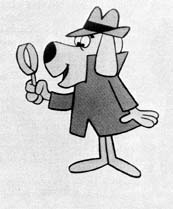 Fox’s Foul Play (The Hunter) – Odd idea for a storyline – especially easy when you provide no explanation for how it was accomplished. Baseballs all over the league are suddenly disappearing in mid-air and in mid-pitch between the mound and the plate. This keeps up until the umpires run out of balls entirely, and the entire day’s league play grinds to a halt. A call goes out for the Hunter to track down the missing baseballs. Suspecting the Fox, the Hunter responds with a seemingly endless string of baseball puns: “He won’t get to first base. I’ll strike him out. I’m on the ball. He’s way off base. I’ll stop him from stealing. Jokes – I got a million of ‘em.” Hunter overhears someone talking about someone at Coney Island keeping ten balls in the air at once, and hurries to the amusement park, attempting to arrest a juggler who he believes is the Fox in disguise. All the Hunter accomplishes is getting tossed around in the air along with the balls, untul he staggers away from the juggler’s stage, totally dizzy. He next spots a carnival booth offering three tosses of baseballs for a quarter. Again attempting to make an arrest, the Hunter only receives a bop on the head with a ball from the angry carny, and the unplanned opportunity to substitute as the new dodger for the customers to bean with baseballs, at a hole in the rear tent wall of the booth. Twice as dizzy now, the Hunter finally encounters another booth, where the real Fox, not even in disguise, offers for sale thousands of “autographed” baseballs (all signed by his own hand) as valuable souvenirs of what will now be the former national game. As usual, the Hunter fails entirely to recognize his suspect, and thinks buying one of the balls will be a good investment for the future. He attempts to select a ball from the middle of a stack, but topples the whole pile on the ground. Clutching for anything to catch his balance, the Hunter grabs at the booth, violently shaking the structure and all the baseballs within it. CRASH! The whole booth crumbles, with baseballs scattered everywhere, and the Fox knocked cold. Officer Flim Flannagan arrives on the scene, crediting the Hunter with capturing the Fox and recovering all the baseballs. Asking the Hunter what he can do to show his appreciation, he receives a simple request from the Hunter. “Just show me the way to go home, son. Those baseballs hit me in the eyes, and got me blind as a bat. Blind as a bat – that’s a joke, son. Baseball? Bat?” The officer doesn’t react, and the temporarily unsighted Hunter gropes for his own way home, muttering “He just doesn’t seem to be alert.”
Fox’s Foul Play (The Hunter) – Odd idea for a storyline – especially easy when you provide no explanation for how it was accomplished. Baseballs all over the league are suddenly disappearing in mid-air and in mid-pitch between the mound and the plate. This keeps up until the umpires run out of balls entirely, and the entire day’s league play grinds to a halt. A call goes out for the Hunter to track down the missing baseballs. Suspecting the Fox, the Hunter responds with a seemingly endless string of baseball puns: “He won’t get to first base. I’ll strike him out. I’m on the ball. He’s way off base. I’ll stop him from stealing. Jokes – I got a million of ‘em.” Hunter overhears someone talking about someone at Coney Island keeping ten balls in the air at once, and hurries to the amusement park, attempting to arrest a juggler who he believes is the Fox in disguise. All the Hunter accomplishes is getting tossed around in the air along with the balls, untul he staggers away from the juggler’s stage, totally dizzy. He next spots a carnival booth offering three tosses of baseballs for a quarter. Again attempting to make an arrest, the Hunter only receives a bop on the head with a ball from the angry carny, and the unplanned opportunity to substitute as the new dodger for the customers to bean with baseballs, at a hole in the rear tent wall of the booth. Twice as dizzy now, the Hunter finally encounters another booth, where the real Fox, not even in disguise, offers for sale thousands of “autographed” baseballs (all signed by his own hand) as valuable souvenirs of what will now be the former national game. As usual, the Hunter fails entirely to recognize his suspect, and thinks buying one of the balls will be a good investment for the future. He attempts to select a ball from the middle of a stack, but topples the whole pile on the ground. Clutching for anything to catch his balance, the Hunter grabs at the booth, violently shaking the structure and all the baseballs within it. CRASH! The whole booth crumbles, with baseballs scattered everywhere, and the Fox knocked cold. Officer Flim Flannagan arrives on the scene, crediting the Hunter with capturing the Fox and recovering all the baseballs. Asking the Hunter what he can do to show his appreciation, he receives a simple request from the Hunter. “Just show me the way to go home, son. Those baseballs hit me in the eyes, and got me blind as a bat. Blind as a bat – that’s a joke, son. Baseball? Bat?” The officer doesn’t react, and the temporarily unsighted Hunter gropes for his own way home, muttering “He just doesn’t seem to be alert.”
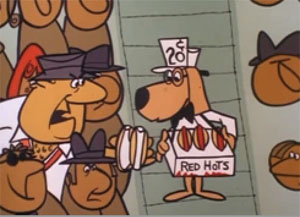 Frankfurter Fix (The Hunter), though possibly released earlier than the last title, seems like a poorer retread of the same cartoon. At baseball stadiums around the league, Frankfurters are disappearing from buns the moment they are sold (again by means unexplained). Why are we waiting until after the sales? Why not just make them disappear right out of the vendors’ baskets? The hunter poses as a vendor, but gets socked when two hot fogs disappear from his first customer’s buns. The Hunter gets down to the “meat” of the problem, and makes a connection between Frankfurters and Frankfurt, Germany. He flies his own plane to Europe, but gets his navigation crossed-up, crashing the plane into the Eiffel tower. A taxi driver in a café below offers help to the Hunter, found dangling from a parachute caught in a tree, and quotes the Hunter a price to drive him to Frankfurt for 50 Francs. Hearing the word, “Francs”, the Hunter thinks of Franks, and places the driver under arrest. Instead, the Hunter winds up in jail for false imprisonment, and is deported by return plane back to the states. En route, he hears two men talking about their sons, who both happen to be named Frank, and of one always being in hot water. Another false arrest, and Hunter is thrown off the plane at the next stop. But of course, the Fox is nearby, running an all-you-can-eat hot dog buffet for 25 cents. As in the last cartoon, the Hunter attempts to buy a meal deal, clumsily climbs atop a stack of boxes of hot dogs, and brings the whole pile down on the Fox. Flannagan again credits the Hunter with solving the case, and the Hunter prepares to leave, taking one hot dog in a bun with him. The Fox, however, makes a quick substitution of a small firecracker in place of the hot dog, and the cartoon simply ends with a bang.
Frankfurter Fix (The Hunter), though possibly released earlier than the last title, seems like a poorer retread of the same cartoon. At baseball stadiums around the league, Frankfurters are disappearing from buns the moment they are sold (again by means unexplained). Why are we waiting until after the sales? Why not just make them disappear right out of the vendors’ baskets? The hunter poses as a vendor, but gets socked when two hot fogs disappear from his first customer’s buns. The Hunter gets down to the “meat” of the problem, and makes a connection between Frankfurters and Frankfurt, Germany. He flies his own plane to Europe, but gets his navigation crossed-up, crashing the plane into the Eiffel tower. A taxi driver in a café below offers help to the Hunter, found dangling from a parachute caught in a tree, and quotes the Hunter a price to drive him to Frankfurt for 50 Francs. Hearing the word, “Francs”, the Hunter thinks of Franks, and places the driver under arrest. Instead, the Hunter winds up in jail for false imprisonment, and is deported by return plane back to the states. En route, he hears two men talking about their sons, who both happen to be named Frank, and of one always being in hot water. Another false arrest, and Hunter is thrown off the plane at the next stop. But of course, the Fox is nearby, running an all-you-can-eat hot dog buffet for 25 cents. As in the last cartoon, the Hunter attempts to buy a meal deal, clumsily climbs atop a stack of boxes of hot dogs, and brings the whole pile down on the Fox. Flannagan again credits the Hunter with solving the case, and the Hunter prepares to leave, taking one hot dog in a bun with him. The Fox, however, makes a quick substitution of a small firecracker in place of the hot dog, and the cartoon simply ends with a bang.
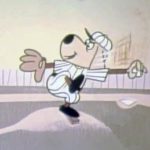 Eye on the Ball (The Hunter) is a departure episode, without a case for the Hunter to solve or the Fox to be found. The Hunter’s nephew Horace is manager of a junior baseball team, the Golden Gulch Galloping Gophers. Trouble is, they’re short one player for a big game. Horace decides to enlist his uncle to substitute into the roster. Uncle is snoring away in his office, and Hoace awakens him, inquiring about Uncle’s previous history as a baseball player. The Hunter begins to recount his start with the Cornpone Colts (a farm team), then traded to the Dixie Dodgers, the Swannee River Swallows, the Cotton Sox, and finally the Possum Holler Giants. Horace asks if Uncle is a righty or a lefty. The Hunter replies that Horace ought to know that he is strictly a “Southpaw”. Horace springs the question as to whether Uncle will play for his team, and the Hunter attempts to dodge out, claiming he’s exceptionally busy on a number of big cases. “Unc says okay”, shouts Horace to his teammates outside, ignoring Uncle’s protests, and the Hunter is carried out of the office bodily by the whole team.
Eye on the Ball (The Hunter) is a departure episode, without a case for the Hunter to solve or the Fox to be found. The Hunter’s nephew Horace is manager of a junior baseball team, the Golden Gulch Galloping Gophers. Trouble is, they’re short one player for a big game. Horace decides to enlist his uncle to substitute into the roster. Uncle is snoring away in his office, and Hoace awakens him, inquiring about Uncle’s previous history as a baseball player. The Hunter begins to recount his start with the Cornpone Colts (a farm team), then traded to the Dixie Dodgers, the Swannee River Swallows, the Cotton Sox, and finally the Possum Holler Giants. Horace asks if Uncle is a righty or a lefty. The Hunter replies that Horace ought to know that he is strictly a “Southpaw”. Horace springs the question as to whether Uncle will play for his team, and the Hunter attempts to dodge out, claiming he’s exceptionally busy on a number of big cases. “Unc says okay”, shouts Horace to his teammates outside, ignoring Uncle’s protests, and the Hunter is carried out of the office bodily by the whole team.
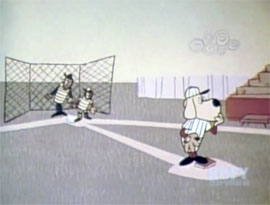 The Hunter is started as pitcher. His first ball dies and rolls to a stop just shy of the plate, and the Hunter claims they’ve put the plate farther away from the mound than they did in his old days. The Hunter resets his sights, aiming a little higher – and sails one clear over the batter’s and umpire’s heads. The Hunter claims he’s merely “zeroing in”, and finally gets one in the strike zone – and clear over the fence for a home run. Well, how about catcher? “Have glove, will catch”, quips Uncle. But the Hunter ducks out of the way of the oncoming ball, allowing it to sock the umpire in the chest, then protests that the batter took a swing at him, and “somebody might get hurt.” So, let’s try him at shortstop. He loses sight of a fly ball, and is bopped on the head. Outfield? An expected crash into the fence. Finally, with Horace on base in the bottom of the ninth, the Hunter steps up to bat. Horace calls for Uncle to keep his eye on the ball. The Hunter does, turning his head to watch it pass him, without swinging, for two strikes. Finally, tired of the distraction, the Hunter completely shuts his eyes, and swings blindly – for the game-winning home run. After ther game, Horace asks how he did it. The Hunter brazenly remarks that you just gotta keep your eye on the ball – while stepping upon a stray baseball on the ground, and stumbling for a final fall.
The Hunter is started as pitcher. His first ball dies and rolls to a stop just shy of the plate, and the Hunter claims they’ve put the plate farther away from the mound than they did in his old days. The Hunter resets his sights, aiming a little higher – and sails one clear over the batter’s and umpire’s heads. The Hunter claims he’s merely “zeroing in”, and finally gets one in the strike zone – and clear over the fence for a home run. Well, how about catcher? “Have glove, will catch”, quips Uncle. But the Hunter ducks out of the way of the oncoming ball, allowing it to sock the umpire in the chest, then protests that the batter took a swing at him, and “somebody might get hurt.” So, let’s try him at shortstop. He loses sight of a fly ball, and is bopped on the head. Outfield? An expected crash into the fence. Finally, with Horace on base in the bottom of the ninth, the Hunter steps up to bat. Horace calls for Uncle to keep his eye on the ball. The Hunter does, turning his head to watch it pass him, without swinging, for two strikes. Finally, tired of the distraction, the Hunter completely shuts his eyes, and swings blindly – for the game-winning home run. After ther game, Horace asks how he did it. The Hunter brazenly remarks that you just gotta keep your eye on the ball – while stepping upon a stray baseball on the ground, and stumbling for a final fall.
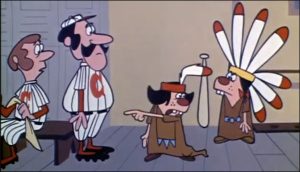 The Cleveland Indians (Go Go Gophers, air date unknown, circa 1964) – Colonel Kit Coyote gets a brilliant idea from reading the sports pages of the paper. Seeing an article reading “Cleveland Loves Indians”, the Colonel calls for his Sergeant to arrange for a pow-wow with Ruffle Feather and Running Board, to convince the Gopher Indians to relocate to Cleveland, a place that will love them. The Sergeant points out that the article is talking about baseball players, not Native Americans. The Colonel doesn’t care what they play, as long as he can dump the Gophers there.
The Cleveland Indians (Go Go Gophers, air date unknown, circa 1964) – Colonel Kit Coyote gets a brilliant idea from reading the sports pages of the paper. Seeing an article reading “Cleveland Loves Indians”, the Colonel calls for his Sergeant to arrange for a pow-wow with Ruffle Feather and Running Board, to convince the Gopher Indians to relocate to Cleveland, a place that will love them. The Sergeant points out that the article is talking about baseball players, not Native Americans. The Colonel doesn’t care what they play, as long as he can dump the Gophers there.
The Gophers agree to travel with the Colonel to Cleveland, to see if they like the place. Upon arrival, the Colonel quickly finds the Gophers in an awkward situation. They have pitched their teepee right in the middle of the busiest intersection of Main Street, admiring the “hard, dry ground” as a perfect place to make camp. A local officer attempts to arrest them for blocking traffic, and while the Colonel declares he’s an officer too, the policeman is not impressed by his duisplay of counter-rank. The Gophers meanwhile take up positions on either side of the policeman, one bent over in a low crouch behind his back, while the other pushes the cop from the front. The officer tumbles over on his back, and Running Board socks him over the head with his own Billy club. Running Board then yells out his usual gibberish while the Colonel remains aghast at them striking an officer, and asks what Running Board is saying. “He say, Run for it!” responds Ruffle Feather. All three run in high gear to get out of there.
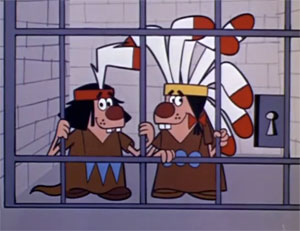 After an exhausting run, the boys find themselves just outside the entrance to the Cleveland Baseball Stadium. The Colonel decides to take them inside, and see if the team will accept them. Upon spotting the old-fashioned moustached players in the locker room, the Gophers complain that these are not real Indians, but fakes. A melee breaks out, with the Gophers swatting at the imposters with bats. Finally, convinced the intruders are crazy, the whole team pursues the Gophers and the Colonel out of the stadium. Night time finds our trio no better off than before, with the Gophers now intrigued by the entrance to a swank night club, which the Colonel tells them is a place to make merry and dance. The Gophers barge their way in, and engage in their own brand of making merry – a food fight, and plate-throwing just for good measure. All three are ejected forcibly – right through the wall. The Colonel hits his head on a telephone pole, and is knocked cold, while the Gophers, thinking him merely asleep from exhaustion, sally forth to do more sightseeing.
After an exhausting run, the boys find themselves just outside the entrance to the Cleveland Baseball Stadium. The Colonel decides to take them inside, and see if the team will accept them. Upon spotting the old-fashioned moustached players in the locker room, the Gophers complain that these are not real Indians, but fakes. A melee breaks out, with the Gophers swatting at the imposters with bats. Finally, convinced the intruders are crazy, the whole team pursues the Gophers and the Colonel out of the stadium. Night time finds our trio no better off than before, with the Gophers now intrigued by the entrance to a swank night club, which the Colonel tells them is a place to make merry and dance. The Gophers barge their way in, and engage in their own brand of making merry – a food fight, and plate-throwing just for good measure. All three are ejected forcibly – right through the wall. The Colonel hits his head on a telephone pole, and is knocked cold, while the Gophers, thinking him merely asleep from exhaustion, sally forth to do more sightseeing.
When the Colonel awakens, he finds himself on a bunk in the local jail. His next door cell-mates are the Gophers. Awakening him is the mayor of Cleveland, who declares that he’s been in contact with the Colonel’s superior officer. Said officer and the mayor deliver the Colonel an ultimatum – get the Gophers out of Cleveland within the hour, or the Colonel loses his commission permanently. Ruffle Feather sees a chance for some dealing, and announces (with a wink to the audience to let us know he’s fibbing), that the gophers like it in Cleveland. What will the Colonel do for them if they agree to go back to Gopher Gulch? The Colonel responds, “Anything!” The final scene returns us to the Gopher’s reservation, where Ruffle Feather is being given a back scrub in a washtub by the Colonel, and instructing him that after the bath, the Colonel can fix lunch, wash clothes, hoe garden, sweep teepee, and plant corn. We’ll have to wait for the next adventure to see how the Colonel gets out of it.
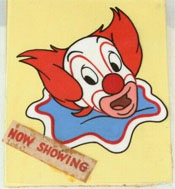 Ball Park Lark (Larry Harmon Productions, Bozo the Clown, circa 1062) – Why the circus would own and operate a baseball stadium, with Bozo’s face appearing in giant form as the entrance gate to the stadium, is anybody’s guess. But the Ringmaster pits Bozo in charge of the Main Entrance for a 4th of July game, and instructs him to be sure no gate crashers enter – especially Wacko Wolf. Of course, who is the first attendee Bozo encounters, but Wacko, dressed in drag, looking about as convincing a woman as Fred Flintstone. Wacko claims he doesn’t need to show Bozo a ticket, and says Bozo would know why if he’d look at that sign over yonder When Bozo turns to look, Wacko posts a sign on another wall reading “Ladies Free Today”, then tells Bozo, “You’re looking the wrong way” to call his attention back to the sign. Wacko almost makes it inside, but catches his dress hem on an obstruction, revealing his trousers underneath. Bozo flips a lasso over Wacko, and drags him out by the waist, tossing him into a hot dog vendor’s wagon. Wacko complains about the hot dog found draped upon his snout, stating he told the vendor he wanted it without mustard.
Ball Park Lark (Larry Harmon Productions, Bozo the Clown, circa 1062) – Why the circus would own and operate a baseball stadium, with Bozo’s face appearing in giant form as the entrance gate to the stadium, is anybody’s guess. But the Ringmaster pits Bozo in charge of the Main Entrance for a 4th of July game, and instructs him to be sure no gate crashers enter – especially Wacko Wolf. Of course, who is the first attendee Bozo encounters, but Wacko, dressed in drag, looking about as convincing a woman as Fred Flintstone. Wacko claims he doesn’t need to show Bozo a ticket, and says Bozo would know why if he’d look at that sign over yonder When Bozo turns to look, Wacko posts a sign on another wall reading “Ladies Free Today”, then tells Bozo, “You’re looking the wrong way” to call his attention back to the sign. Wacko almost makes it inside, but catches his dress hem on an obstruction, revealing his trousers underneath. Bozo flips a lasso over Wacko, and drags him out by the waist, tossing him into a hot dog vendor’s wagon. Wacko complains about the hot dog found draped upon his snout, stating he told the vendor he wanted it without mustard.
Wacko next poses as a press photographer to get in free. Bozo questions whether the “shoebox” he is carrying is a real camera. Wacko offers to demonstrate by taking Bozo’s picture. But Bozo cleverly turns the tables, grabbing up the camera, and instead offering to take Wacko’s picture. He presses the shutter button, and out pops a boxing glove on a spring mounting, socking Wacko in the nose, and leaving his snout bent and dangling.
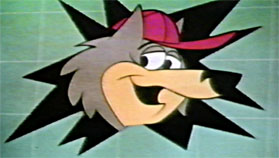 Now Wacko resorts to an old stand-by prop – a giant rubber band strung between two trees, to project himself into the park by slingshot. A first attempt gains no elevation, crashing him into the side of the stadium wall. Wacko tries again, raising his sights. He sails a good way in, but collides with an elevated brick wall of a storehouse within the stadium, where the Fourth of July fireworks rest in just unpacked crates at the entrance below. Wacko lands among the fireworks, and Bozo races inside, having spotted him sailing over the fence. Wacko claims that he belongs in the stadium, as he is a real baseballer, and looks around for a bat to swing. Mistaking a large skyrocket for a bat, he seizes it, and runs full speed toward home plate/ The stadium announcer and visiting team mistake him for a pinch-hitter, and Wacko steps up to the plate. The pitcher winds up for a fast ball – a real fire-ball. The ball advances like a red comet, bit proves to be even more of a literal fireball than usual, when it stops before Wacko, pops open at the seams, and a small mechanical hand extends a miniature cigarette lighter, lighting the fuse on Wacko’s “bat”. Wacko takes off with the rocket in a blur – “Out of the park – where he belongs”, remarks Bozo. Wacko’s rocket makes several U-turns, the crashes him head-first through the back of the electric scoreboard sending it into short circuits. Wacko remarks that he sure did break up their little game, and ends the film with typical demented laughter.
Now Wacko resorts to an old stand-by prop – a giant rubber band strung between two trees, to project himself into the park by slingshot. A first attempt gains no elevation, crashing him into the side of the stadium wall. Wacko tries again, raising his sights. He sails a good way in, but collides with an elevated brick wall of a storehouse within the stadium, where the Fourth of July fireworks rest in just unpacked crates at the entrance below. Wacko lands among the fireworks, and Bozo races inside, having spotted him sailing over the fence. Wacko claims that he belongs in the stadium, as he is a real baseballer, and looks around for a bat to swing. Mistaking a large skyrocket for a bat, he seizes it, and runs full speed toward home plate/ The stadium announcer and visiting team mistake him for a pinch-hitter, and Wacko steps up to the plate. The pitcher winds up for a fast ball – a real fire-ball. The ball advances like a red comet, bit proves to be even more of a literal fireball than usual, when it stops before Wacko, pops open at the seams, and a small mechanical hand extends a miniature cigarette lighter, lighting the fuse on Wacko’s “bat”. Wacko takes off with the rocket in a blur – “Out of the park – where he belongs”, remarks Bozo. Wacko’s rocket makes several U-turns, the crashes him head-first through the back of the electric scoreboard sending it into short circuits. Wacko remarks that he sure did break up their little game, and ends the film with typical demented laughter.
• “Ball Park Lark” is on the Internet Archive
NEXT WEEK: More odds and ends off the bench.